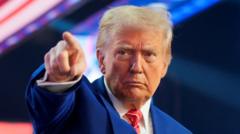President-elect Donald Trump ignited controversy at the Turning Point USA annual conference when he criticized the high fees imposed by Panama on American shipping through the Panama Canal. Speaking to a large gathering of conservative supporters in Arizona, Trump branded the fees as "exorbitant" and unfair, suggesting that they harm American interests. He declared, "This complete rip-off of our country will immediately stop," signaling his intention to address the issue as soon as he takes office next month.
Trump's remarks quickly drew a sharp rebuke from President José Raúl Mulino of Panama, who fiercely defended his country's ownership, stating that "every square metre" of the canal territory belongs to Panama. He adamantly emphasized that Panama's sovereignty and autonomy were non-negotiable, feeling the pressure of Trump's bold declaration.
This declaration is particularly significant as it provides a glimpse into the potential recalibration of U.S. foreign policy once Trump enters the White House. His comments followed a similar statement indicating his belief that the Panama Canal is a "vital national asset" for the U.S. If Panama doesn't comply with his demand for lower shipping rates, he insisted, "we will demand that the Panama Canal be returned to us, in full, quickly and without question."
The Panama Canal, a critical 51-mile link between the Atlantic and Pacific oceans, has been under Panamanian control since 1999, after the U.S. transferred authority following a series of treaties initiated in the late 1970s. The canal sees nearly 14,000 ships annually, including vital commercial vessels and military craft.
Beyond his focus on Panama, Trump also criticized trade practices from Canada and Mexico, amplifying his administration's problematic immigration narrative while simultaneously showering praise on Mexican President Claudia Sheinbaum. His speech reiterated familiar themes from his campaign, touching upon issues of immigration, crime, and foreign trade—topics that have resonated strongly among his conservative base.
Turning Point USA played a significant role in boosting Trump's presidential bid, advocating on behalf of his policies throughout the electoral process. Despite the divisions within the Republican Party that have emerged among politicians regarding issues such as government spending, Trump’s address avoided these tensions, concentrating instead on solidifying support from his core audience and reiterating his commitment to his policy objectives.
The political media landscape will be watching closely to see how Trump's statements may influence U.S.-Panama relations and whether any tangible actions will arise from his declarations once he assumes the presidency.




















